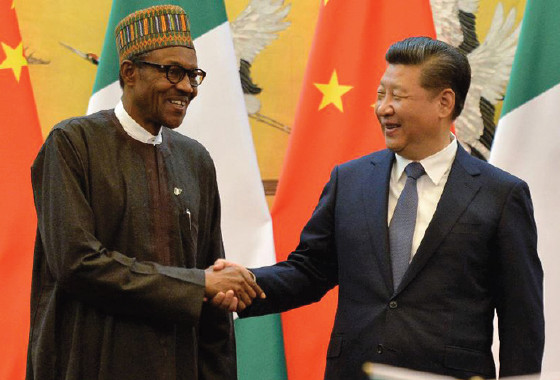Americaм§Скµ≠мЭі мХДнФДл¶ђмєімЭШ мЮ†мސ놕мЭД лБМмЦіл³놧 нХЬлЛ§ China Seeks to Unleash Africas Potential
1980лЕДлМА мЭінЫД, лПЩмЬ†лЯљ, мХДмЛЬмХД, лЭЉнЛі мХДл©Фл¶ђмєілКФ мҐА лНФ лЖТмЭА мГЭнЩЬмИШм§АмЭД мЪФкµђнХШлКФ мДЄк≥ДнЩФлЭЉлКФ мУ∞лВШлѓЄмЧР мЛЬлː놧 мШ§к≥† мЮИлЛ§. нКєнЮИ м§Скµ≠мЭА мДЄк≥ДнЩФл•Љ мЭімЪ©нХі лєДкµР лМАмГБм°∞м∞® мЧЖлКФ мД±мЮ•мДЄл•Љ кµђк∞АнХімЩФлЛ§. л∞Шл©і мХДнФДл¶ђмєілКФ мЧђм†ДнЮИ лєИк≥§мЭШ мИШл†БмЧР лє†мІД м±Д кЈЄлМАл°ЬлЛ§. кЈЄлЯђлВШ мШ§лКШлВ† м§Скµ≠мЭШ мИШмґЬнИђмЮР м£ЉлПД мД±мЮ•мЭі лСФнЩФлРШл©імДЬ, м§Скµ≠мЭі мЮРмЛ†мЭШ мЭінХімЩА мХДнФДл¶ђмєімЭЄлУ§мЭШ мЭінХіл•Љ мЬДнХі мХДнФДл¶ђмєімЭШ к≤љм†Ьм†Б мЮ†мސ놕мЭД нЩЬмЪ©нХШ놧лКФ л™®мКµмЭі к∞АмЛЬм†БмЬЉл°Ь лУЬлЯђлВШк≥† мЮИлЛ§. м§Скµ≠мЭШ мХДнФДл¶ђмєі м†ДлЮµмЭА лђімЧЗмЭЄк∞А? мХДнФДл¶ђмєімЩА м§Скµ≠мЧР мШИмЄ°лРШлКФ мЧђнММлКФ лђімЧЗмЭЉкєМ? м†Д мІАкµђміМмЭШ л≤ИмШБк≥Љ кµ≠м†Ь кіАк≥ДкєМмІА нЩХлМАнХ† лХМ мЭілЯђнХЬ м§Скµ≠мЭШ мХДнФДл¶ђмєі м†ДлЮµмЭі мЭШлѓЄнХШлКФ л∞ФлКФ?
м§Скµ≠мЧРк≤М к≤АмЭА лМАл•Щ мХДнФДл¶ђмєілКФ нЩ©кЄИк≥Љ к∞ЩмЭА кЄ∞нЪМл•Љ мЭШлѓЄнХЬлЛ§. мХДнФДл¶ђмєілКФ 19мДЄкЄ∞ мЬ†лЯљмЭЄлУ§мЭі лЛємЛЬ м†ХкЄАмЭД мІАлПДнЩФнХШмІА мХКмХШкЄ∞ лХМлђЄмЧР к≤АмЭА лМАл•ЩмЬЉл°Ь м≤ШмЭМ мХМ놧м°МлЛ§. кµђкЄА мД§л¶љмЮР лЮШл¶ђ нОШмЭімІА(Larry Page)лКФ мХДнФДл¶ђмєімЭШ лІОмЭА мІАмЧ≠мЭі м†Д놕 лґАм°±мЬЉл°Ь мЬДмД±мВђмІДмЧР к±∞мЭШ л≥імЭімІА мХКлКФлЛ§к≥† лІРнХЬ лМАл°Ь, мЭі мЭіл¶ДмЭА мШ§лКШлВ†мЧРлПД мЧђм†ДнЮИ мЬ†нЪ®нХШлЛ§.
кЈЄл¶ђк≥† м†ДкЄ∞к∞А мЧЖлКФ к≥≥мЧРлКФ мЭЄнД∞лДЈ мВђмЪ©мЭі мЧЖк≥† к≤љм†Ь мД±мЮ•лПД л≤ИмШБлПД мЧЖлЛ§.
м†Д놕лІЭ кµђмґХк≥Љ кЄ∞нГА мЧђлЯђ нШХнГЬмЭШ мЭЄнФДлЭЉ нИђмЮРк∞А м†ИмЛ§нХШк≤М нХДмЪФнХЬ мХДнФДл¶ђмєілКФ м§Скµ≠мЧРк≤М мЮИмЦі мЩДл≤љнХЬ нММнКЄлДИк∞А лРШк≥† мЮИлЛ§. м§Скµ≠мЭА мИШмЛ≠ мЦµ лЛђлЯђмЧР мЭіл•ілКФ нИђмЮР мЮРл≥ЄмЭД к∞ЦмґФк≥† мЮИлЛ§. мµЬкЈЉ мЭілЯђнХЬ нИђмЮРк∞А мХДнФДл¶ђмєімЧРмДЬ лє†л•ік≤М м¶Эк∞АнХШк≥† мЮИлКФлН∞, м§Скµ≠ мГБлђілґА мЮРл£МмЧР лФ∞л•іл©і, к∞ЬмЭЄ мЖМмЬ† м§Скµ≠ кЄ∞мЧЕлУ§мЭШ 2000лЕД мХДнФДл¶ђмєі м†Ьм°∞мЧЕ лєДм¶ИлЛИмК§мЧР лМАнХЬ нИђмЮРлКФ лЛ® 2к±імЭімЧИмІАлІМ, нШДмЮђлКФ лІ§лЕД 150к±і мЭімГБмЭШ нИђмЮР мЛ§м†БмЭД л≥імЧђм£Љк≥† мЮИлЛ§. лІ•нВ®мІА(McKinsey) нФДл°Ьм†ЭнКЄ кіАл¶ђ лЛілЛємЮР мХДмЭіл¶∞ мЬ†мХИ мД†(Irene Yuan Sun)мЭі кЄ∞к≥†нХЬ гАМнХШл≤Дм¶И лєДм¶ИлЛИмК§ л¶ђлЈ∞(Harvard Business Review)гАНмЭШ кЄАмЧР лФ∞л•іл©і, "мЛ§м†Ь мИШмєШлКФ мХДлІИлПД мµЬлМА 2л∞∞мЧРмДЬ 3л∞∞мЧР мЭіл•Љ к≤ГмЭілЛ§. нХілЛє м£Љм†ЬмЧР кіАнХЬ нШДмЮ• м°∞мВђл•Љ нХШк≥† мЮИлКФ нХЩмЮРлУ§мЭі м†ХлґА лН∞мЭінД∞мЧР нПђм∞©лРШмІА мХКмЭА м§Скµ≠ кЄ∞мЧЕлУ§к≥Љ мЭЉмГБм†БмЬЉл°Ь лІМлВШк≥† мЮИлЛ§."
мЬ†мХИ мД†мЭА мХДнФДл¶ђмєімЧРмДЬ мВђмЧЕмЭД мЛЬмЮСнХЬ л™Зл™З м§Скµ≠ кЄ∞мЧЕлУ§мЭШ мВђл°Ал•Љ м∞ЊмХДлГИлЛ§. лВШмЭімІАл¶ђмХДк∞А к∞АмЮ• лІОмЭі мИШмЮЕнХШк≥† мЮИмЧИлНШ м†ЬнТИмЭі мДЄлЭЉлѓємЭЄ к≤ГмЭД мХМк≤М лРЬ мД† мІАмХЩ(Sun Jian)к≥Љ к∞ЩмЭА мВђмЧЕк∞АлКФ, лВШмЭімІАл¶ђмХДмЧР мДЄлЭЉлѓє нГАмЭЉ к≥µмЮ•мЭД мІУкЄ∞ мЬДнХі 4м≤ЬлІМ лЛђлЯђл•Љ нИђмЮРнЦИк≥† 1,100л™ЕмЭД к≥†мЪ©нЦИлЛ§. м†Д놕мЭі лґИмХИм†ХнХШк≥† лєДмЛЄмІАлІМ мХДнФДл¶ђмєімЧРмДЬ мД† мІАмХЩмЭШ мИШмЭµ лІИмІДмЭА 7нНЉмДЉнКЄл°Ь, мЭік≤ГмЭА кЈЄк∞А м§Скµ≠мЧР лПЩмЭЉнХЬ к≥µмЮ•мЭД кµђмґХнХі л≤МмЦілУ§мЭЄ мИШмЭµ лІИмІД 5нНЉмДЉнКЄл≥ілЛ§ лНФ лЖТмЭА мИШмєШлЛ§.
мЭі мВђл°АмЧРмДЬ л≥імЧђм£ЉлУѓ, мХДнФДл¶ђмєі м†Ьм°∞ мВ∞мЧЕмЧР лМАнХЬ м§Скµ≠мЭШ нИђмЮРлКФ м†Ал†інХЬ лМАлЯЙмГЭмВ∞ м†ЬнТИмЧР лМАнХЬ мХДнФДл¶ђмєімЭШ мЖМлєД мИШмЪФк∞А м¶ЭлМАлРШл©імДЬ мЬ†мЭШлѓЄнХЬ к≤ГмЭі лРШк≥† мЮИлЛ§. лШРнХЬ кЄИмДЄкЄ∞ міИл∞Ш кЄЙмЖНнХЬ к≤љм†Ь мД±мЮ•мЭД к∞Ам†ЄмШ® м§Скµ≠мЭШ м†АлєДмЪ© м†Ьм°∞ мЪ∞мЬДк∞А лЛ§мЭМк≥Љ к∞ЩмЭА мЧђлЯђ мЭімЬ†лУ§л°Ь мЭЄнХі к≥†м†ДмЭД л©імєШ л™їнХШк≥† мЮИлКФ мЛ§м†ХмЭілЛ§.
- м§Скµ≠мЭШ лЕЄлПЩ놕 нТА(pool)мЭі мЮ†мЛЭлРШк≥† мЮИлЛ§. мЭік≤ГмЭА мШ§лЮЬ кЄ∞к∞Д нХЬ мЮРлЕА м†Хм±ЕмЭі лІМлУ† к≤∞к≥ЉлЛ§. мЭіл°Ь мЭЄнХі м§Скµ≠ к≥µмЮ•лУ§мЭі нШДмЮђ м†КмЭА лЕЄлПЩ놕 лґАм°±мЭД к≤™лКФ мИШм§АкєМмІА мґЬмГЭ땆мЭі л³놧к∞ФлЛ§.
- лПЩмЛЬмЧР к≥µмЮ• лЕЄлПЩмЮРмЧР лМАнХЬ к≥†мЪ©м£Љ к∞ДмЭШ к≤љмЯБмЭі мєШмЧінХімІАл©імДЬ, 2001лЕД мЭінЫД лІ§лЕД 12нНЉмДЉнКЄмФ© мЮДкЄИмЭі мЭЄмГБлРШмЧИлЛ§. мЭіл†Зк≤М кЊЄм§АнЮИ 16лЕДк∞Д мЮДкЄИмЭі м¶Эк∞АнХШлЛ§л≥ілЛИ нШДмЮђ м§Скµ≠мЭШ к≥µмЮ• мЭЄк±ілєДлКФ л≤†нКЄлВ®, л∞©кЄАлЭЉлН∞мЛЬ, лѓЄмЦАлІИ, мЛђмІАмЦі мЭЄлПДл≥ілЛ§лПД лЖТлЛ§.
мДЄк≥ДмЭАнЦЙ м†Д(еЙН) мИШмДЭ к≤љм†ЬнХЩмЮР м†АмК§нЛі мЭінЫД л¶∞(Justin Yifu Lin)мЭШ лІРмЭД лєМл¶ђл©і, кЈЄ к≤∞к≥ЉлКФ мЭіл†ЗлЛ§.
"м§Скµ≠мЭА м†АмИЩ놮 м†Ьм°∞мЧЕ мЭЉмЮРл¶ђл•Љ м°ЄмЧЕнХШкЄ∞ мІБм†ДмЧР лПДлЛђнЦИлЛ§. (...) мЭік≤ГмЭА м†АмЖМлУЭ кµ≠к∞АлУ§ лВімЧРмДЬ м†Ьм°∞мЧЕ к≥†мЪ©мЭД 4л∞∞ мЭімГБ лБМмЦілВЉ мИШ мЮИмЭД м†ХлПДл°Ь, лЕЄлПЩ мІСмХљм†Б мЭЉмЮРл¶ђлІМ к±∞мЭШ 1мЦµ к∞Ь мЭімГБмЭілЛ§."
лМАлґАлґДмЭШ кµ≠к∞АмЧРмДЬ мґЬмГЭ땆мЭА кЄЙлЭљнХШк≥† мЮИлЛ§. нХШмІАлІМ мХДнФДл¶ђмєі мЭЄкµђлКФ лє†л•ік≤М м¶Эк∞АнХШк≥† мЮИмЦі 2050лЕДкєМмІА мХљ 20мЦµ л™Е мЭімГБ мґЬмГЭнХ† к≤ГмЬЉл°Ь мШИмГБлРШл©∞, лМАлґАлґДмЭА мХДмІБ мґЬмГЭнХШмІА мХКмХД кЈЄлХМк∞А лРШл©і мЭілУ§мЭі л™®лСР 30мДЄ лѓЄлІМмЭі лР† к≤ГмЭілЛ§. к≤∞к≥Љм†БмЬЉл°Ь мХДнФДл¶ђмєілКФ мДЄк≥Д мµЬлМАмЭШ лЕЄлПЩ놕мЭД лМАнСЬнХШк≤М лР† к≤ГмЭілЛ§.
кЈЄлЯђлВШ нШДмЮђ мЭілЯђнХЬ л™®лУ† мЮ†мЮђм†Б лЕЄлПЩ놕мЭД мИШмЪ©нХ† мґ©лґДнХЬ мЭЉмЮРл¶ђк∞А мЧЖлЛ§. мЬ†мХИ мД†мЧР лФ∞л•іл©і, "нШДмЮђ мХДнФДл¶ђмєі кµ≠к∞АлУ§мЭА мДЄк≥ДмЧРмДЬ к∞АмЮ• лЖТмЭА мЛ§мЧЕ땆мЭД кЄ∞л°ЭнХШк≥† мЮИлЛ§. лВШмЭімІАл¶ђмХДмЭШ к≥µмЛЭ мЛ§мЧЕ땆мЭА 12.1нНЉмДЉнКЄмІАлІМ, м†ХлґАлКФ мЈ®мЧЕ мЧ∞л†є мЭЄкµђмЭШ 19.1нНЉмДЉнКЄл•Љ лґИмЩДм†Д к≥†мЪ©мЬЉл°Ь нММмХЕнХШк≥† мЮИлЛ§. м≤≠лЕДмЄµмЭШ к≤љмЪ∞ мЛ§мЧЕ땆мЭА 42.2нНЉмДЉнКЄмЧР мЭіл•ЄлЛ§."
мЭілЯђнХЬ л™®лУ† мЭЄкµђ нЖµк≥ДнХЩм†Б, к≤љм†Ьм†Б мЪФмЖМлУ§мЭі нХ®мЭШнХШлКФ л∞ФлКФ л™ЕнЩХнХШлЛ§. мХДнФДл¶ђмєімЧРмДЬ мЭЉмЮРл¶ђмЩА мЭЄнФДлЭЉл•Љ м∞љмґЬнХШл©імДЬ м§Скµ≠мЭі мЮРмЛ†лУ§мЭШ к≤љм†Ь лђЄм†Ьл•Љ нХік≤∞нХ† мИШ мЮИлКФ мЩДл≤љнХЬ м°∞к±імЭД м°∞мД±нХ† мИШ мЮИлЛ§.
гАМнПђлЄМмК§гАНмЧР лФ∞л•іл©і 2015лЕД м§Скµ≠мЭА мХДнФДл¶ђмєімЭШ к≤љм†Ь мЧ≠лЯЙмЭД к∞Ьл∞ЬнХШкЄ∞ мЬДнХі м£ЉмЪФ мЮРл≥Є нФДл°Ьм†ЭнКЄмЧР 600мЦµ лЛђлЯђл•Љ нИђмЮРнХ† к≤ГмЭД мХљмЖНнЦИлЛ§. м§Скµ≠мЭШ мЛЬмІДнХС(Xi Jinping) міЭл¶ђлКФ нИђмЮРмЮРлУ§мЧРк≤М мШђл∞Фл•ік≥† мҐЛмЭА мЭЉмЭД нХШлПДл°Э нХШлКФ к≤ГмЭіл©∞, мЭі нФДл°ЬкЈЄлЮ®мЭі м§Скµ≠к≥Љ мХДнФДл¶ђмєі к∞ДмЭШ мЛ§мІИм†БмЭЄ мЬИмЬИ нШС놕мЭД кµђмґХнХШкЄ∞ мЬДнХЬ мЛЬлПДлЭЉк≥† л∞ЭнШФлЛ§. мЭік≤ГмЭА лЛ®мИЬнХЬ л¶љ мДЬлєДмК§к∞А мХДлЛИмЧИлЛ§. 2016лЕД 9мЫФкєМмІА м§Скµ≠ кЄ∞мЧЕлУ§мЭА мЭілѓЄ 140мЦµ лЛђлЯђл•Љ мХДнФДл¶ђмєімЧР нИђмЮРнЦИлЛ§.
мХДнФДл¶ђмєімЭШ мЭЄнФДлЭЉ, к≤љм†Ь л∞Ьм†Д л∞П мВ∞мЧЕнЩФмЧР лМАнХЬ м§Скµ≠мЭШ нИђмЮРлКФ мИШлІОмЭА мХДнФДл¶ђмєімЭЄлУ§мЧРк≤М м§Скµ≠мЭШ мЭШлПДк∞А мҐЛлЛ§лКФ мЭЄмЛЭмЭД лґИлЯђмЭЉмЬЉнВ§к≥† мЮИлЛ§. мХДнФДл¶ђмєі 36к∞Ькµ≠ 5лІМ6м≤Ь л™ЕмЭД лМАмГБмЬЉл°Ь мЛ§мЛЬнХЬ нПђлЄМмК§ мД§лђЄм°∞мВђмЧРмДЬ 3лґДмЭШ 2к∞А мЮРкµ≠мЧР лМАнХЬ м§Скµ≠мЭШ мШБн֕놕мЭД "лЛ§мЖМ кЄНм†Хм†Б"мЧРмДЬ "лІ§мЪ∞ кЄНм†Хм†Б"мЭілЭЉк≥† лМАлЛµнЦИлЛ§.
нХЬнОЄ лЛ§мЦСнХЬ мЧ∞кµђ к≤∞к≥ЉлУ§лПД м§Скµ≠ кЄ∞мЧЕлУ§мЭі м§Скµ≠мЭЄ лЕЄлПЩмЮРлІМ м±ДмЪ©нХЬлЛ§лКФ мХДнФДл¶ђмєі лВі мЭЄмЛЭмЭі мЮШл™їлРЬ к≤ГмЮДмЭД л≥імЧђм£Љк≥† мЮИлЛ§. мХДнФДл¶ђмєі лВі м§Скµ≠мЭЄ мЖМмЬ† к≥µмЮ•мЭШ мІБмЫР 78мЧРмДЬ 98нНЉмДЉнКЄк∞А мХДнФДл¶ђмєімЭЄмЭілЛ§.
м†Ьм°∞мЧЕ мЭЉмЮРл¶ђлІМмЭі мХДнФДл¶ђмєі к≤љм†ЬмЧР лМАнХЬ мЬ†мЭЉнХЬ нШЬнГЭмЭА мХДлЛИлЛ§. мГИл°ЬмЪі м†Ьм°∞мЧЕ мЭЉмЮРл¶ђ нХШлВШк∞А 1.6к∞ЬмЭШ мДЬлєДмК§ мЭЉмЮРл¶ђл•Љ м∞љмґЬнХЬлЛ§. к≥µмЮ• лЕЄлПЩмЮРлУ§мЭі мЛЭмВђл•Љ нХ† мИШ мЮИлКФ к≥≥к≥Љ к≥µмЮ•мЬЉл°Ь мґЬкЈЉнХШлКФ лН∞ кµРнЖµмЭі нХДмЪФнХШкЄ∞ лХМлђЄмЭілЛ§. лНФмЪ±мЭі к≤љм†Ь мЭіл°†мЧР лФ∞л•іл©і нХЬ кµ≠к∞А лВімЧРмДЬ к≤љмЯБмЭі мєШмЧінХімІАк≥† мГЭмВ∞мД±мЭі нЦ•мГБлРШл©імДЬ мХДнФДл¶ђмєімЧРмДЬмЭШ м†Ьм°∞мЧЕмЭі мІДнЩФнХШмЧђ лНФ л≥µмЮ°нХШк≥† к≥†кЄЙнЩФлРЬ м†ЬнТИмЭД нГДмГЭмЛЬнВ®лЛ§. кЈЄ к≤∞к≥Љ, мИШмЭµ лІИмІДмЭі мї§мІАк≥† мХДнФДл¶ђмєі лЕЄлПЩмЮРлУ§мЭА мХИм†Хм†БмЭЄ мЮДкЄИ мИШмЭµмЭД мЦїк≤М лРШмЦі кЈЄлУ§мЭШ мГЭнЩЬмИШм§АмЭД лЖТмЭЉ мИШ мЮИлЛ§.
мЬ†мХИ мД†мЭі мІАм†БнХЬ л∞ФмЩА к∞ЩмЭі, "148к∞Ь кµ≠мЭД лґДмДЭнХЬ к≤∞к≥Љ, GDPк∞А м¶Эк∞АнХШл©імДЬ нХЬ кµ≠к∞А лВімЭШ м†Ьм°∞мЧЕм≤ілУ§мЭі м†Рм†Р лНФ л≥µмЮ°нХЬ м†ЬнТИмЭД мГЭмВ∞нХШлКФ л∞©нЦ•мЬЉл°Ь мЭілПЩнХШлКФ к≤ГмЬЉл°Ь мШИк≤ђлРЬлЛ§. кЈЄл†Зк≤М лРШл©і 10лЕД нШємЭА 20лЕД нЫДмЧРлКФ мХДнФДл¶ђмєі лВі к≥µмЮ•лУ§мЭі мДЄлЭЉлѓємЭілВШ мЭШл•Ш лМАмЛ† мїінУ®нД∞л•Љ лМАлЯЙ мГЭмВ∞нХШк≤М лР† к≤ГмЭілЛ§. мЭік≤ГмЭі м†Ьм°∞мЧЕ нИђмЮРк∞А мХДнФДл¶ђмєі к∞Ьл∞ЬмЭШ нХµмЛђ мЪФмЖМмЭЄ мЭімЬ†мЭілЛ§. к≤љм†ЬнХЩмЮРлУ§мЭА мЮ•кЄ∞м†БмЬЉл°Ь лНФ лЖТмЭА мГЭнЩЬмИШм§АмЭД лІМлУЬлКФ мЬ†мЭЉнХЬ л∞©л≤ХмЭі мГЭмВ∞мД±мЭД лНФ лЖТк≤М мШђл¶ђлКФ к≤ГмЮДмЭД мХМк≥† мЮИлЛ§."
кЈЄлЯђлВШ м§Скµ≠мЭі мХДнФДл¶ђмєімЧР лМАнХЬ нИђмЮРл°ЬлґАнД∞ мЭімЭµмЭД мЦїмІА л™їнХЬлЛ§л©і, кЈЄк≤ГмЭА мЛЬмІДнХСмЭі мХљмЖНнХЬ мЬИмЬИ к±∞лЮШк∞А мХДлЛИлЛ§. мЭЉлґА кіАк≥ДмЮРлУ§мЧР лФ∞л•іл©і, м§Скµ≠мЭА мХДнФДл¶ђмєімЭШ нЩШк≤љк≥Љ мЮ•кЄ∞м†Б л≤ИмШБмЧР лМАнХі лІЙлМАнХЬ лєДмЪ©мЭД мєШл•іл©імДЬлПД, к±∞лЮШмЧРмДЬ мИШмЭµмЭД мЦїк≥† мЮИлЛ§.
гАМнХШл≤ДлУЬ нПіл¶ђнЛ∞мїђ л¶ђлЈ∞(Harvard Political Review)гАНмЧРмДЬлКФ мЭіл†Зк≤М мД§л™ЕнХЬлЛ§.
"м§Скµ≠мЭА м†Ьм°∞мЧЕ мЬ†мІАмЧР нХДмЪФнХЬ м≤ЬмЧ∞ мЮРмЫРмЭШ мХИм†Хм†БмЭЄ мЬ†мЮЕмЭД мЬДнХі мХДнФДл¶ђмєі мЛЬмЮ•мЧР мЭШм°інХШк≥† мЮИлЛ§. м§Скµ≠мЭі мИШмЮЕнХШлКФ мХДнФДл¶ђмєі мЮРмЫРмЭА лІ§мЪ∞ лЛ§мЦСнХЬлН∞, мЫРмЬ†мЧРмДЬ м≤†кіСмДЭ, л™©мЮђ, кµђл¶ђмЧР мЭіл•ікЄ∞кєМмІА к±∞мЭШ л™®лУ† к≤ГмЧР нХілЛєнХЬлЛ§. мЮРмЫРмЧР лМАнХЬ кіСл≤ФмЬДнХЬ м†СкЈЉмЧР лМАнХЬ лМАк∞Ал°Ь, м§Скµ≠мЭА м†Ал†інХЬ м†Ьм°∞ мГБнТИмЭД кµРмЧ≠ мГБлМАкµ≠мЧР мИШмґЬнХШк≥† нХДмЪФнХЬ мЭЄнФДлЭЉл•Љ кµђмґХнХШл©∞ мЩЄкµ≠ мІБм†С нИђмЮРмЩА мИШмЛ≠мЦµ лЛђлЯђмЭШ мЩЄнЩШмЭД м†Ьк≥µнХШк≥† мЮИлЛ§."
мЭілЯђнХЬ мЮРкЄИ нЭРл¶ДмЧР лМАнХЬ м∞ђмД±л°†мЮРлУ§мЭА мЭік≤ГмЭі мХДнФДл¶ђмєі к∞Ьл∞ЬмЭД міЙмІДмЛЬнВђ к≤ГмЭілЭЉк≥† м£ЉмЮ•нХШлКФ л∞Шл©і, мХДнФДл¶ђмєімЧР лМАнХЬ м§Скµ≠мЭШ м†Хм±ЕмЭД лєДнМРнХШлКФ мЭілУ§мЭА м§Скµ≠мЭі мЮРмЛ†лУ§к≥Љ кіАк≥ДлРЬ мХДнФДл¶ђмєі кµ≠к∞АлУ§мЭД мХљнЩФмЛЬнВ§к≥† мХДнФДл¶ђмєімЭЄлУ§мЭШ нЭђмГЭмЬЉл°Ь мЮРмЛ†лУ§мЭі нБ∞ мЭімЭµмЭД л≥ілКФ лђімЧ≠ лґИкЈ†нШХмЭД мЭЉмЬЉнВ§к≥† мЮИлЛ§к≥† мЭімХЉкЄ∞нХЬлЛ§. мЭілЯђнХЬ лєДнМРл°†мЮРлУ§мЭА м§Скµ≠мЭі мГИл°ЬмЪі мЛЭлѓЉ кґМ놕мЬЉл°Ь мЮРл¶ђлІ§кєАнХШ놧лКФ мЛЬлПДл•Љ нХШк≥† мЮИмЬЉл©∞, м§Скµ≠ мГБнТИмЭі мХДнФДл¶ђмєі мЛЬмЮ•мЭД нЬ©мУЄл©імДЬ мХДнФДл¶ђмєі мІАмЧ≠ мГЭмВ∞мЮРлУ§мЭі к≤љмЯБнХШкЄ∞ мֳ놧мЪі к∞ТмЛЉ м†ЬнТИмЭД лМАлЯЙ мГЭмВ∞нХШк≥† мЮИлЛ§к≥† нПЙк∞А м†ИнХШнХШк≥† мЮИлЛ§.
м§Скµ≠мЭШ мХДнФДл¶ђмєі мІДмґЬмЭД мЦілЦїк≤М ліРмХЉ нХ† к≤ГмЭЄк∞А? мХЮмЬЉл°Ь мЦілЦ§ мЭЉмЭі мЭЉмЦілВ† к≤ГмЭЄк∞А? мВђмЛ§к≥Љ м†ДлІЭмЭД л∞ФнГХмЬЉл°Ь мЪ∞л¶ђлКФ мХЮмЬЉл°Ь мЭЉмЦілВ† 4к∞АмІАл•Љ лІРнХ† мИШ мЮИлЛ§.
м≤ЂмІЄ, мХДнФДл¶ђмєілКФ м§Скµ≠мЧР мЬ†л¶ђнХЬ мИШмґЬ мЛЬмЮ•мЭД мД†л≥імЭіл©∞, м§Скµ≠мЭШ лВімИШ лґАмІДмЭД мГБмЗДмЛЬмЉЬм§Д мИШ мЮИмЭД к≤ГмЭілЛ§.
м§Скµ≠мЭА к≥µмЮ•мЭД нПРмЗДнХШкЄ∞л≥ілЛ§лКФ м§Скµ≠лВімЧРмДЬ м†Рм∞® мї§мІАк≥† мЮИлКФ нТНмЪФ мЭЄкµђ нШємЭА мДЄлМАлУ§мЭі лНФ мЭімГБ мЫРнХШмІА мХКлКФ мИШлІОмЭА м†Ак∞АнШХ м†ЬнТИмЭД мИШмґЬнХ† мИШ мЮИлЛ§. лПЩмЛЬмЧР м§Скµ≠ к≥µмЮ•мЭД мХДнФДл¶ђмєімЧР лСРл©і м§Скµ≠ кЄ∞мЧЕлУ§мЭі л≤†нКЄлВ®, л∞©кЄАлЭЉлН∞мЛЬ, лѓЄмЦАлІИ, мЛђмІАмЦі мЭЄлПДмЭШ лНФ м†Ал†інХЬ лЕЄлПЩ놕к≥ЉлПД к≤љмЯБнХ† мИШ мЮИлЛ§. мДЬкµђ кЄ∞мЧЕлУ§мЭА м§Скµ≠лІМнБЉ к≥µк≤©м†БмЬЉл°Ь мЫАмІБмЭімІА мХКк≥† мЮИлЛ§. лФ∞лЭЉмДЬ м§Скµ≠мЭі мДЄк≥Д мµЬлМАмЭШ лЕЄлПЩ놕 нТА(pool)мЭД нЩХл≥інХШл©і мДЬкµђ кЄ∞мЧЕлУ§мЭА м§Скµ≠ кЄ∞мЧЕмЧР лТ§м≤ШмІИ мЬДкЄ∞мЧР м≤ШнХ† мИШ мЮИлЛ§.
лСШмІЄ, мХДнФДл¶ђмєімЧР лМАнХЬ м§Скµ≠мЭШ к≤љм†Ьм†Б нИђмЮРлКФ мДЄк≥Д міИк∞ХлМАкµ≠мЭі лРШ놧лКФ мХЉлІЭмЭД мґФкµђнХ† мИШ мЮИлПДл°Э нХім§Д к≤ГмЭілЛ§.
м§Скµ≠мЭШ нИђмЮРк∞А мХДнФДл¶ђмєімЭШ к≤љм†Ь л∞Ьм†ДмЧР міИм†РмЭД лІЮмґФк≥† мЮИлКФ к≤Гм≤ШлЯЉ л≥імЭімІАлІМ, мЛ§мІИм†БмЭЄ л™©нСЬлКФ мІАкµђміМмЧРмДЬ мДЄк≥Дм†БмЭЄ кµ∞мВђм†Б мЪ∞мЬДмЩА м†ХмєШм†Б мШБн֕놕мЭД нЩХл≥інХШ놧лКФ к≤ГмЭілЛ§. лѓЄ нХікµ∞мВђкіАнХЩкµРмЭШ нХЬ кµРмИШк∞А гАМнХШл≤ДлУЬ нПіл¶ђнЛ∞мїђ л¶ђлЈ∞гАНмЧРмДЬ л∞ЭнШФлУѓмЭі, "м§Скµ≠мЭА кЈЄлУ§мЭі к∞ХлМАкµ≠ мІАмЬДмЭШ мЮРк≤©мЭД к∞ЦмґФк≥† мЮИлЛ§к≥† лКРлВАлЛ§. лФ∞лЭЉмДЬ мДЄк≥Д мІИмДЬ мЬ†мІАл•Љ мЬДнХі нХ≠мГБ мЮ•кЄ∞м†БмЭЄ мЩЄкµР м†Хм±Е л™©нСЬл•Љ мЬ†мІАнХШк≥† мЮИлЛ§. (...) мХДнФДл¶ђмєілКФ лѓЄкµ≠к≥Љ мДЬкµђ мІАл∞∞мЭШ мДЄк≥Д мІИмДЬл°ЬлґАнД∞ м§Скµ≠мЭШ мЩЄкµР м†ХмєШм†Б мШБн֕놕мЬЉл°Ь мЭілПЩнХШлКФ лН∞ мЮИмЦі мЧДм≤≠лВЬ мЩЄкµРм†Б лђік≤Мл•Љ мІАлЛИк≥† мЮИлЛ§." м§Скµ≠мЭШ нИђмЮРк∞А мЛЬмЮСлРШл©імДЬ 2016лЕД м§Скµ≠ мµЬміИмЭШ мХДнФДл¶ђмєі лВі кµ∞мВђ кЄ∞мІАк∞А к±імД§лРШкЄ∞ мЛЬмЮСнХЬ к≤ГмЭА мЪ∞мЧ∞мЭі мХДлЛИлЛ§. мЭі кЄ∞мІАлКФ мХДнФДл¶ђмєімЧРмДЬ к∞АмЮ• нБ∞ лѓЄкµ∞ кЄ∞мІАмЧРмДЬ 10лІИмЭЉлПД м±Д лЦ®мЦімІАмІА мХКмХШлЛ§.
мЕЛмІЄ, м§Скµ≠мЭА м†ХмєШм†Б мІАмЫРмЧР лМАнХЬ лМАк∞Ал°Ь к∞Ьл∞ЬлПДмГБкµ≠мЧР к≤љм†Ь мЫРм°∞л•Љ м†Ьк≥µнХШлКФ м†Хм±ЕмЭД мВђмЪ©нХ† к≤ГмЭілЛ§.
лѓЄкµ≠мЭА 1970лЕД мЭінЫД 3м≤ЬмЦµ лЛђлЯђ мЭімГБмЭШ к∞Ьл∞Ь мЫРм°∞л•Љ мХДнФДл¶ђмєімЧР мПЯмХД лґАмЭА мДЬкµђ кµ≠к∞АлУ§ к∞АмЪілН∞ нХШлВШмЭік≥†, мЭілЯђнХЬ мЫРм°∞л•Љ л∞ЫкЄ∞ мЬДнХі нХілЛє кµ≠к∞АлУ§мЭі мЭЄкґМ кЄ∞м§АмЭД мґ©м°±нХШлПДл°Э мЪФкµђнХімЩФлЛ§. кЈЄлЯђлВШ м§Скµ≠мЭА кЈЄлЯђнХЬ м°∞к±імЭД лґАмЧђнХШмІА мХКлКФлЛ§. лМАмЛ† м§Скµ≠мЭШ мЫРм°∞лКФ к∞АлВЬнХЬ лВШлЭЉк∞А м§Скµ≠мЭШ лМАмЩЄ м†Хм±Е м†ДлЮµк≥Љ мЭЉмєШлРШлКФмІАмЭШ мЧђлґАмЧР кЄ∞л∞ШмЭД лСРлКФ к≤ГмЬЉл°Ь л≥імЭЄлЛ§. мШИл•Љ лУ§мЦі, гАМмЭімљФлЕЄлѓЄмК§нКЄгАН мІАлКФ мµЬкЈЉ мІРл∞ФлЄМмЫ®, лґАл£ђлФФ, мХМм†Ьл¶ђк∞А лґБнХЬмЧР лМАнХЬ UN мЭЄкґМ к≤∞мЭШмХИмЧР л∞ШлМАнЦИк≥†, мЉАлГР, л™®мЮ†лєДнБђ, мЧРнЛ∞мШ§нФЉмХДлКФ кЄ∞кґМмЭД нХЬ м†РмЭД мІАм†БнХЬлЛ§. мХДнФДл¶ђмєі кµ≠к∞АлУ§мЭА м§Скµ≠к≥Љ нХ®кїШ нСЬл•Љ лНШмІАлКФ к≤ГмЭі лНФ лІОмЭА мЫРм°∞л°Ь мЭімЦімІДлЛ§лКФ м†РмЭД л∞∞мЪ∞к≥† мЮИлЛ§.
мЬМл¶ђмЧД мХ§ л©Фл¶ђ мїђл¶ђмІА(the College of William and Mary)мЭШ нХімЩЄ мЫРм°∞ лН∞мЭінД∞ кЄ∞кіА мЧРмЭілУЬлН∞мЭінД∞(AidData) мЧ∞кµђмЧР лФ∞л•іл©і, м§Скµ≠к≥Љ нХ®кїШ нСЬл•Љ лНШм†Є 10нНЉмДЉнКЄ м¶Эк∞Ак∞А л∞ЬмГЭнХШл©і, мХДнФДл¶ђмєі кµ≠к∞АлУ§мЭі к∞Бк∞Б 86нНЉмДЉнКЄмЭШ мґФк∞А мЫРм°∞л•Љ л∞ЫлКФ к≤ГмЬЉл°Ь лВШнГАлВђлЛ§. 67нНЉмДЉнКЄмЭШ лєДм§СмЬЉл°Ь м§Скµ≠к≥Љ нХ®кїШ нСЬл•Љ лНШмІАлКФ л•імЩДлЛ§к∞А кЈЄ лєДм§СмЭД 93%л°Ь лКШл¶ђл©і 289нНЉмДЉнКЄл°Ь мЫРм°∞л•Љ лКШл¶і мИШ мЮИлЛ§. мЭілЯђнХЬ л∞©мЛЭмЬЉл°Ь м§Скµ≠мЭі нИђнСЬл•Љ лІ§мИШнХ† мИШ мЮИлЛ§л©і, м§Скµ≠мЭШ мЭімЭµмЧР л∞ШнХШлКФ лѓЄкµ≠ м£ЉлПДмЭШ к≤∞мЭШмХИ м±ДнГЭмЭД л∞©мЦінХШлКФ лН∞ м†Рм∞® мД±к≥µмЭД к±∞лСШ мИШ мЮИк≤М лР† к≤ГмЭілЛ§.
лДЈмІЄ, м§Скµ≠мЭШ лПЩкЄ∞мЧР мГБкіАмЧЖмЭі нИђмЮРлКФ мХДнФДл¶ђмєімЧР мВ∞мЧЕ нШБл™ЕмЭШ лПДлЮШл•Љ к∞АмЖНнЩФнХШлКФ лН∞ лПДмЫАмЭі лР† к≤ГмЭілЛ§.
к≤љм†Ьл•Љ мВ∞мЧЕнЩФнХ®мЬЉл°ЬмН® мХДнФДл¶ђмєілКФ мЭЉл≥Є, нХЬкµ≠, лМАлІМ, м§Скµ≠мЭі мВђмЪ©нХЬ к≤Гк≥Љ лПЩмЭЉнХЬ нМ®нДімЬЉл°Ь л∞Ьм†ДнХ† к≤ГмЭілЛ§. к≥µмЮ•мЭА лКШмЦілВЬ мЭЄкµђл•Љ мЬДнХЬ мЭЉмЮРл¶ђл•Љ м†Ьк≥µнХ† к≤ГмЭік≥† лПДмЛЬл°Ь лМАлЯЙ мЭім£Љк∞А мЭЉмЦілВ† к≤ГмЭілЛ§. мХИм†Хм†БмЭЄ мЮДкЄИмЭД нЖµнХі, мИШмЦµ л™ЕмЭШ мХДнФДл¶ђмєімЭЄлУ§мЭі лНФ лЖТмЭА лЖТмЭА мГЭнЩЬмИШм§АмЭД лИДл¶ђк≥† м†Ьм°∞ мГБнТИмЭШ мІБм†С мЖМлєДмЮРл°Ь л≥Ал™®нХ† к≤ГмЭілЛ§.
гАМнХШл≤ДлУЬ лєДм¶ИлЛИмК§ л¶ђлЈ∞гАНмЧР лФ∞л•іл©і, "м§Скµ≠мЭі 30лЕД лІМмЧР нХілГИлУѓмЭі мХДнФДл¶ђмєілПД 30лЕД лІМмЧР м†Ил∞ШмЭШ мЭЄкµђл•Љ лєИк≥§мЧРмДЬ л≤ЧмЦілВШк≤М нХШл©і кµ≠к≤љ лВімЭШ кЈємЛђнХЬ лєИк≥§ лђЄм†Ьк∞А мЭЉк±∞мЧР нХімЖМлР† к≤ГмЭілЛ§. к±∞мЭШ 4мЦµ л™ЕмЭШ мВђлЮМлУ§мЧРк≤М кЈЄк≤ГмЭА л∞∞к≥†нФФмЭД л≤ЧмЦілВШлКФ к≤Г, мЭЉмЮРл¶ђл•Љ мЦїлКФ к≤Г, мХИм†Хм†БмЭЄ мІБмЧЕмЭД к∞ЦлКФ к≤Г, мЮРлЕАлУ§мЧРк≤М - лЛ§л•Є м†ХмГБ кµ≠к∞АлУ§м≤ШлЯЉ - к∞Ал≤ЉмЪі мЭЉмЭілВШ мЛђлґАл¶Д, нШємЭА мІСмХИ мЭЉлІМ мЛЬнВ§лКФ к≤Г, мЮРлЕАлУ§мЭД нХЩкµРмЧР л≥ілВілКФ к≤ГмЭД мЭШлѓЄнХЬлЛ§. мДЄк≥ДмЧРмДЬ к∞АмЮ• лєИк≥§нХЬ мІАмЧ≠лУ§ м§СмЭШ нХЬ к≥≥мЧРмДЬ лєИк≥§к≥Љ 됪벺땆мЭД м§ДмЭілКФ мЭЉмЭА мЭШмЛђнХ† мЧђмІАмЧЖмЭі мДЄк≥Д к≤љм†ЬмЧР кЄНм†Хм†БмЭЄ л∞Ьм†ДмЭЉ к≤ГмЭілЛ§.
* * *
лѓЄлФФмЦі лЄМл¶ђнХСмК§ DB мДЬлєДмК§лКФ зЊО м†Хл≥ім†Ьк≥µз§Њк≥Љ м†ХмЛЭк≥ДмХљмЬЉл°Ь м†Ьк≥µлРШлКФ мІАмЛЭ м†Хл≥і мљШнЕРмЄ†мЮЕлЛИлЛ§.
лѓЄлФФмЦі лЄМл¶ђнХСмК§ DB мДЬлєДмК§лКФ м†Д мДЄк≥Д м£Љл†• м†АлДР л∞П лІ§м≤імЧРмДЬ л≥ілПДнХШк≥† лґДмДЭнХЬ нШБмЛ† мХДмЭілФФмЦімЩА м†Хл≥і мЖМмК§л•Љ мЧДмД†нХШмЧђ нШДмЮђ мДЄк≥Дм†БмЭЄ л¶ђлФ©(leadinng) лѓЄлФФмЦілУ§мЭі м£Љл™©нХШк≥† мЮИлКФ мХДмЭінЕЬлУ§мЭД кµђм≤ім†БмЬЉл°Ь л≥імЧђм§НлЛИлЛ§.
м†ХмєШ, к≤љм†Ь, лђЄнЩФ лУ± к∞Б лґДмХЉмЧРмДЬ мДЄк≥Дл•Љ мЫАмІБмЭік≥† мЮИлКФ нШємЭА мДЄк≥Дл•Љ мЫАмІБмЭЉ мХДмЭінЕЬмЭі лђімЧЗмЭЄмІА нММмХЕнХШк≥†, мЭімЧР м£Љл™©нХШмЧђ мІСм§С м°∞л™ЕнХ®мЬЉл°ЬмН® к±∞мЭЄмЭШ мЦікє®мЧРмДЬ мДЄмГБмЭД л∞ФлЭЉл≥ілКФ нЖµм∞∞놕мЬЉл°Ь мХИлВінХ©лЛИлЛ§.
л≥Є лѓЄлФФмЦі лЄМл¶ђнХСмК§ мљШнЕРмЄ†лКФ м†АмЮСкґМл≤ХмЭШ л≥інШЄл•Љ л∞ЫлКФ мљШнЕРмЄ†мЮЕлЛИлЛ§(мЭімЪ©лђЄмЭШ - лД§мШ§лДЈмљФл¶ђмХД, 02-539-3233).
China Seeks to Unleash AfricaвАЩs PotentialTo China, the вАЬDark ContinentвАЭ is a golden opportunity. Africa first became known as the вАЬDark ContinentвАЭ because nineteenth century Europeans had not yet mapped its jungles. Today, the name still applies because, as Google founder Larry Page once pointed out, the lack of electricity throughout much of Africa makes it nearly invisible in satellite photos.
And where thereвАЩs no electricity, thereвАЩs no Internet usage, no economic growth, and no prosperity.
AfricaвАЩs desperate need to build a power grid and to attract other types of infrastructure investments makes it a perfect partner for China, which has billions in capital to invest. In recent years, those investments are growing swiftly. Data from the Chinese Ministry of Commerce show that privately owned Chinese companies made two investments in African manufacturing businesses in 2000; today, theyвАЩre making more than 150 investments a year. According to a Harvard Business Review article by Irene Yuan Sun, вАЬThe real figure is probably two or three times as large: Scholars doing fieldwork on the topic routinely encounter Chinese companies that have not been captured by government data.вАЭ1
Sun, who is an engagement manager at McKinsey, found several examples of Chinese entrepreneurs who have opened businesses in Africa, such as Sun Jian, who discovered that the heaviest product Nigeria was importing was ceramics, so he invested $40 million to build a ceramic tile factory in Nigeria with a workforce of 1,100. Even though electricity is unreliable and expensive, SunвАЩs profit margin in Africa is 7 percent, a significant increase over the 5 percent margin he earned when he located his plant in China.
As this example illustrates, Chinese investments in African manufacturing make sense because of rising consumer demand in Africa for cheap, mass-produced goods, even as demand for those products falls in China and throughout the developed world. In addition, ChinaвАЩs low-cost manufacturing advantage, which fueled its rapid economic growth earlier this century, is crumbling for a variety of reasons:
- ChinaвАЩs labor pool is shrinking because its shortsighted one-child policy lowered its birth rate to the point that ChinaвАЩs factories now face shortages of young workers.
- At the same time, increasing competition among employers for factory workers has driven wages up, with hourly wages rising 12 percent per year since 2001. After sixteen years of steady increases, factory labor costs are now significantly higher in China than in Vietnam, Bangladesh, Myanmar, and even India.
The result, according to former World Bank chief economist Justin Yifu Lin, is that вАЬChina is on the verge of graduating from low-skilled manufacturing jobsвА¶. That will free up nearly 100 million labor-intensive manufacturing jobs, enough to more than quadruple manufacturing employment in low-income countries.вАЭ
While the birth rate is plummeting in most countries, AfricaвАЩs population is accelerating so quickly that it is expected to have more than two billion people by 2050, and most of them havenвАЩt been born yet, which means they will be under thirty. As a result, Africa will represent the worldвАЩs biggest labor pool.
But there arenвАЩt enough jobs for all of the potential workers today. According to Sun, вАЬAfrican nations have some of the highest unemployment rates in the world. The official unemployment rate in Nigeria is 12.1 percent, but the government recognizes an additional 19.1 percent of the working-age population as вАШunderemployed.вАЩ For young people, the situation is much worse: Youth unemployment is at 42.2 percent.вАЭ
All of these demographic and economic forces are colliding to create the perfect conditions for China to solve its own economic problems while creating jobs and infrastructure in Africa.
According to Forbes, in 2015 China pledged to invest $60 billion in major capital projects to help develop AfricaвАЩs economic capacity.2 Chinese president Xi Jinping described the program as an effort to create вАЬreal win-win cooperationвАЭ between Africa and China, while enabling investors to вАЬdo good while doing right.вАЭ And it wasnвАЩt just talk: By September 2016, Chinese companies had already invested $14 billion.
The countryвАЩs investments in AfricaвАЩs infrastructure, economic development and industrialization have created a sense among many Africans that ChinaвАЩs intentions are good. A survey cited in Forbes of 56,000 people in thirty-six African countries found that two-thirds believe that ChinaвАЩs influence in their countries was вАЬsomewhat positiveвАЭ to вАЬvery positive.вАЭ3
Meanwhile, findings from a variety of studies reveal that the perception in Africa that Chinese companies only hire Chinese workers is wrong. Between 78 percent and 99 percent of employees in Chinese-owned factories in Africa are African.
Manufacturing jobs are not the only benefit to the African economy. Every new manufacturing job creates 1.6 service jobs, because factory workers need to buy meals or pay for transportation to work. Moreover, economic theory suggests that as competition intensifies and productivity improves within a country, manufacturing in Africa will evolve to en- compass more complex, higher-end goods. As that occurs, and as margins increase, African workers will earn wage gains that will elevate their standard of living.
As Sun points out, вАЬAn analysis of 148 countries shows that as GDP rises, manufacturers within a country predictably move toward ever more complicated products. In another decade or two, factories in Africa will be churning out computers instead of ceramics and clothing. ThatвАЩs why investment in manufacturing is the key to AfricaвАЩs development. Economists know that in the long run, the only way to create higher standards of living is to become more productive.вАЭ
However, it isnвАЩt the вАЬwin-winвАЭ deal that Xi promised unless China benefits from its investments in Africa. According to some concerned observers, China is not only profiting from the arrangement, but it is doing so at a great cost to AfricaвАЩs environment and long-term prosperity.
As an article in the Harvard Political Review explains, вАЬChina relies on African markets for a steady flow of natural resources to sustain manufacturing.4 The African resources China imports are varied, covering everything from oil, to iron ore, timber, and copper. In exchange for broad access to resources, China exports cheap manufactured goods back to its trading partners, builds much needed infrastructure, provides foreign direct investments, and loans out billions of dollarsвА¶.
вАЬThough advocates of this inflow of money claim it spurs development, critics of ChinaвАЩs policies in Africa paint a picture of trade imbalances that are handicapping the nations involved, while grossly advantaging China at the expense of the African people. These critics believe that China seeks to establish itself as a new colonial powerвА¶. Chinese goods are also flooding African markets, overwhelming local producers with large volumes of cheap products that are difficult to compete with.вАЭ
Based on this trend, we offer the following forecasts:
First, Africa will present a lucrative export market for China, allowing it to offset declining domestic demand.
Rather than shutting down factories, China can export many of the low-end products that its increasingly affluent population no longer wants. At the same time, putting Chinese factories in Africa enables Chinese companies to compete with cheaper labor in Vietnam, Bangladesh, Myanmar, and even India. Western companies have been moving far less aggressively than China, and they risk falling behind as China taps into the worldвАЩs largest pool of labor.
Second, ChinaвАЩs economic investments in Africa will enable it to pursue its ambition of becoming a global superpower.
Although its investments seemingly focus on AfricaвАЩs economic development, they camouflage ChinaвАЩs goals of gaining global military dominance and political clout on the world stage. As United States Naval Academy professor Yong Deng told the Harvard Political Review, вАЬChina feels that it is entitled to a Great Power status, so maintaining that in a global world order is always a long-term foreign policy goalвА¶ Africa carries an enormous amount of diplomatic weight in [shifting] ChinaвАЩs diplomatic and political influence away from a U.S., Western dominated world order.вАЭ5 ItвАЩs no coincidence that as ChinaвАЩs investments began pouring into the country, it also began building its first military base in Africa in 2016, less than ten miles from the largest U.S. military base in Africa.
Third, China will use a policy of trading economic assistance to developing countries in exchange for political support.
The United States is among the Western countries that have poured more then $300 billion of developmental aid into Africa since 1970. But while the U.S. often requires countries to meet its standards for human rights in order to receive aid, China does not set such conditions. Instead, ChinaвАЩs aid appears to be based on whether the needy country aligns itself with ChinaвАЩs foreign policy strategy. For example, The Economist recently reported that Zimbabwe, Burundi, and Algeria voted against a United Nations resolution to condemn North Korea for human rights abuses, while Kenya, Mozambique, and Ethiopia abstained. African countries have learned that voting with China leads to more aid.6 Research by AidData at the College of William and Mary concludes that for every 10 percent increase in voting with China, an African nation receives 86 percent more aid.7 Rwanda, which votes with China 67 percent of the time, could increase its aid by 289 percent if it voted with China 93 percent of the time. If China is able to buy votes in this way, it will increasingly succeed in blocking U.S.-led resolutions that are contrary to its interests.
Fourth, regardless of ChinaвАЩs motivations, its investments will help to accelerate the arrival of an industrial revolution in Africa.
By industrializing its economy, Africa will evolve according to the same pattern that Japan, South Korea, Tai- wan, and China used. Factories will provide jobs for its expanding population and unleash a mass migration to cities. With steady wages, hundreds of millions of Africans will enjoy higher living standards and become consumers for manufactured goods. According to the Harvard Business Re- view, вАЬIf Africa could lift just half as many people out of poverty as China has in a mere three decades, it will eliminate extreme poverty within its borders. For nearly 400 million people, that would mean the difference between going hungry and being full, between scrounging for work and holding a steady job, between asking their children to do menial labor and sending them to school.вАЭ8 Reducing poverty and boosting literacy in one of the worldвАЩs poorest areas would unquestionably be a positive development for the global economy.
References
1. Harvard Business Review, March/June 2017, вАЬThe WorldвАЩs Next Great Manufacturing Center,вАЭ by Irene Yuan Sun. вУТ 2017 Harvard Business Publishing. All rights reserved. https://hbr.org/2017/05/the-worlds-next-great-manufacturing-center2. Forbes, March 14, 2017, вАЬHow ChinaвАЩs $60 Billion for Africa Will Drive Global Prosperity,вАЭ by Amy Jadesimi. вУТ 2017 Forbes Media LLC. All rights reserved. https://www.forbes.com/sites/amyjadesimi/2017/03/14/how-chinas-60-billion-for-africa-will-drive-global-prosperity/-6700556238a33. iBid4. Harvard Political Review, February 3, 2017, вАЬChinaвАЩs Investment in Africa: The New Colonialism?вАЭ by Elizabeth Manero. вУТ 2017 Harvard Political Review. All rights reserved. http://harvardpolitics.com/world/chinas-investment-in-africa-the-new-colonialism/5. iBid6. The Economist, April 16, 2016, вАЬA DespotвАЩs Guide to Foreign Aid.вАЭ вУТ 2016 The Economist Newspaper Limited. All rights reserved. http://www.economist.com/news/middle-east-and-africa/21697001-want-more-cash-vote-china-united-nations-despots-guide-foreign7. iBid8. Harvard Business Review, March/June 2017, вАЬThe WorldвАЩs Next Great Manufacturing Center,вАЭ by Irene Yuan Sun. вУТ 2017 Harvard Business Publishing. All rights reserved. https://hbr.org/2017/05/the-worlds-next-great-manufacturing-center







